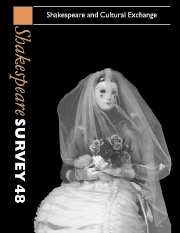Book contents
- Frontmatter
- Shakespeare Translation as Cultural Exchange
- Shakespeare, Theatre Production, and Cultural Politics
- ‘Amphitheaters in the Body’: Playing with Hands on the Shakespearian Stage
- ‘Shakespur and the Jewbill’
- Wilhelm S and Shylock
- Pilgrims of Grace: Henry IV Historicized
- Holy war in Henry V
- Hamlet and the Anxiety of Modern Japan
- Hamlet’s Last Words
- Venetian Culture and the Politics of Othello
- ‘My Music for Nothing’: Musical Negotiations in The Tempest
- The Tempest and Cultural Exchange
- Caliban and Ariel Write Back
- Shakespearian Rates of Exchange in Czechoslovakia 1945–1989
- ‘Are you a Party in this Business?’ Consolidation and Subversion in East German Shakespeare Productions
- The Martyred Knights of Georgian Shakespeariana
- Shakespeare Performances in England, 1993–1994
- Professional Shakespeare Productions in the British Isles, January – December 1993
- 1 Critical Studies
- 2 Shakespeare’s Life, Times, and Stage
- 3 Editions and Textual Studies
- Books Received
- Index
‘My Music for Nothing’: Musical Negotiations in The Tempest
Published online by Cambridge University Press: 28 March 2007
- Frontmatter
- Shakespeare Translation as Cultural Exchange
- Shakespeare, Theatre Production, and Cultural Politics
- ‘Amphitheaters in the Body’: Playing with Hands on the Shakespearian Stage
- ‘Shakespur and the Jewbill’
- Wilhelm S and Shylock
- Pilgrims of Grace: Henry IV Historicized
- Holy war in Henry V
- Hamlet and the Anxiety of Modern Japan
- Hamlet’s Last Words
- Venetian Culture and the Politics of Othello
- ‘My Music for Nothing’: Musical Negotiations in The Tempest
- The Tempest and Cultural Exchange
- Caliban and Ariel Write Back
- Shakespearian Rates of Exchange in Czechoslovakia 1945–1989
- ‘Are you a Party in this Business?’ Consolidation and Subversion in East German Shakespeare Productions
- The Martyred Knights of Georgian Shakespeariana
- Shakespeare Performances in England, 1993–1994
- Professional Shakespeare Productions in the British Isles, January – December 1993
- 1 Critical Studies
- 2 Shakespeare’s Life, Times, and Stage
- 3 Editions and Textual Studies
- Books Received
- Index
Summary
In an early scene of Henry VIII (or All is True), while denouncing the 'spells of France' displayed at the Field of the Cloth of Gold, and the extravagant vanities imitated from the French, Sir Thomas Lovell rejoices in the recent prohibition of these foreign customs and deplores their efficacy in the form of a local 'O tempora, O mores', which is not altogether devoid of personal frustration or innocent of erotic meaning:
LOVELL The sly whoresons Have got a speeding trick to lay down ladies. A French song and a fiddle has no fellow. SANDS The devil fiddle 'em! I am glad they are going,
For sure there's no converting of 'em. Now An honest country lord, as I am, beaten A long time out of play, may bring his plainsong,
And have an hour of hearing, and by'r Lady, Held current music, too.
(Henry VIII 1.3.39-47)The characteristic reduction of music to an object of discourse, the use of the musical double entendre, with the implicit equation of music and love making, and the superior efficacy of French - and now fortunately illicit - music as erotic recipe, thus estrange the musical material in a threefold manner, making it simultaneously improper, foreign, and alien. Music's potential for seduction is held dangerous to courtiers and puritans alike, and its Trojan horse status, on the stage and elsewhere, raises issues of limits and transgression, both semiotic and ideological, not to mention the Mercurial roles of spies, plotters, ambassadors, messengers, regularly ascribed to musicians in the court and on the stage. Whether it is performed by an aerial spirit acting as informer or by a man of mode, music has a taste of the foreign.
- Type
- Chapter
- Information
- Shakespeare Survey , pp. 135 - 146Publisher: Cambridge University PressPrint publication year: 1996

